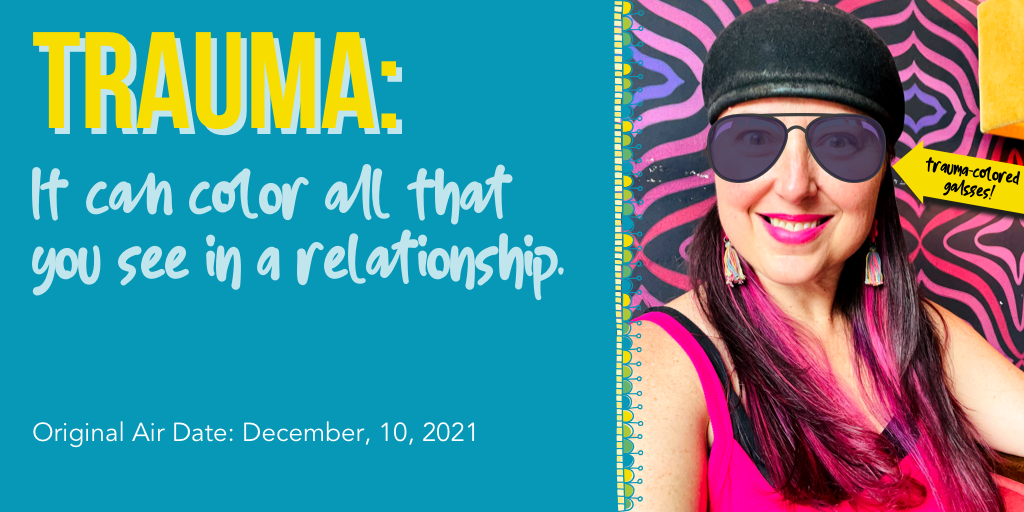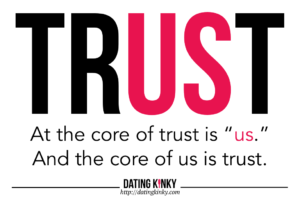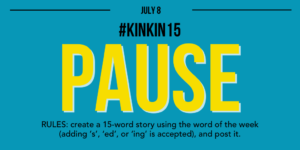On December 10, 2021, I presented the topic ‘Ouch! That STILL Hurts! Navigating trauma in and out of kink.’ for Dating Kinky’s 12 Days of Kinkmas. The original presentation was free to all who joined us live, and was recorded for Dating Kinky’s PLUS members to access through the Dating Kinky Library (over 400 videos and 550 hours of content!).
Here is a clip from that 90-minute show, where I discuss how trauma colors everything we perceive in relationships.
https://youtu.be/PMbaPV19zug
TRANSCRIPT
Trauma can affect what you believe about relationships.
So, when you grow up in a dysfunctional family, you believe that this is how families work—even knowing your family is dysfunctional.
It’s almost incomprehensible to believe that other families can be so different.
You think (not you, the conscious you, but subconsciously), “It feels like they look that way, but there has to be something else down below, right?”
And you know, not to call anybody out, but you know, when I was giving an example earlier and Joey said,
“Who told you you were wrong?” the mere thought of somebody telling a child that they were wrong and thinking, “Well, it must have happened, right? It must have happened to this person because they’re talking about it.”
It’s easy to see trauma when you’ve been through trauma.
It’s not easy to see function when you’ve lived in dysfunction.
And this is a challenge I experience constantly when I’m talking about relationships and building the life that you really want.
That, like the idea that you could be, you could be like me: you could look a bit like a librarian or a suburban soccer mom, you could be a little heavy in the hips, you can be a little chubby, you can be a little difficult to get along with sometimes, and you could still live the life of your dreams with amazing people and never feel
like there is not enough.
But until you get there, until you’ve lived there, is that easy to believe? Is it possible?
Trauma makes it impossible to see possibilities, sometimes.
Or maybe not impossible, you know, I like to say “It’s not impossible, but it’s improbable.”
Trauma makes it improbable to see the positive possibilities in you, in your life, in your partners, in your experiences. They can bias then how you experience everybody in the world.
Somebody will come onto my writing and, like on FetLife, and I’ll have written something about, you know, “Hey, here is a great great way to reach out to people and make better connections!” and they will come on and they will take it like I just personally, attacked them, or their gender, or whatever it is, even though I didn’t even mention them.
In fact most of the time it’s…in my writing I don’t even mention a gender, when I give examples.
Because unless the gender matters, it’s not necessary, but people will gender it, and then take the part of the hurt gender and feel like I’m attacking them.
This is trauma.
—
Oh. For those of you who felt that gut punch, pause and take a deep breath.
I know that feeling.
And once you’ve had a minute to sit with that (if you need to), let’s move on to the OTHER side.
What does it take to communicate with the people in your life who are wearing trauma-colored glasses?
You know, the opposite of rose-colored glasses. Trauma-colored glasses darken everything and bring out the worst possibilities in what they see.
How do you get past that?
Do you?
Sometimes, you don’t. Sometimes people are just not ready, and loving them hard is not enough. Being patient is not enough. Communicating is not enough.
Maybe they need time to themselves. Maybe they need professional help. You just can’t know for sure (unless maybe you ARE a professional in that area, and even then, things get very non-professional when love gets in the way, don’tcha think?)
But, let’s say you are willing to try. Here are a few suggestions:
- Be kind. Kind to them, kind to yourself when you fail to get through. No one is perfect, and no one can do it alone. Frustration or anger, even directed inward will kill your hopes, and send them running.
- Be consistent. Be who you are, and be it constantly for them and with them. This is good for you, too, and if you have difficulty there, look into your own traumas for acknowledged or unacknowledged hurts.
- Be willing to repeat the positive things. A LOT. People with trauma have a hard time hearing good stuff. Say it a lot. SHOW it a lot. Like 10x more than you might think is necessary.
- It’s not about you. Their trauma is not about you. If they accuse you of cheating (and you HAVE NOT AT ALL) or anything else like that, that’s not you they are reacting to. It’s their trauma and fears. No need to get upset back at them. It’s not about you.
- Do not, I repeat DO NOT, try to FORCE them to see or to understand. In many cases, that’s going to be re-traumatizing or traumatizing in a different way. Understand that they have to pick up their pieces on their own. You cannot do it for them. You can help, when they ask you to and in exactly the ways they ask you to. But don’t non-consensually insert yourself into their trauma or their mind. Even if it seems to work, it has a high chance of biting you in the ass later.
What are your thoughts?
Does any of the resonate with you? If you’ve been through trauma, what would you like the people you love to know about being there for you?
If you are a professional, what suggestions might you want to add?
If you have had people in your life with trauma, and you’ve successfully communicated through it, what can you share that has worked for you?







